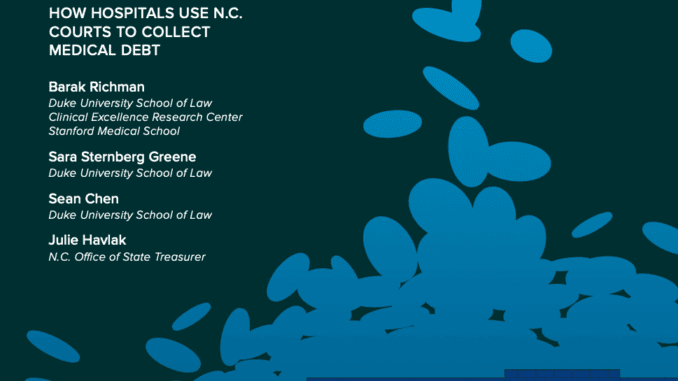
RALEIGH — A new report details lawsuits over medical debt by state hospitals involving more than 5,517 patients. The report covers lawsuits spanning from January 2017 through June 2022 that won $57.3 million in judgments – an average of $16,623 per judgment.
“Many of these legal actions resulted in default judgments in state district courts and included awards of 8% interest charges on patients’ medical debt,” the SHP’s website states. “In total, interest charges and other added fees accounted for 35.4% of the $57.3 million in total judgments owed by patients.”
The data behind the report comes from a study conducted by Duke University School of Law researchers and the North Carolina Office of State Treasurer (OST). The report was published on the N.C. State Health Plan (SHP) website on Aug. 16.
Medical debt judgments can span decades in North Carolina as well as lead to automatic liens against the home of the patient, as the report found in several cases.
The study reported that interest charges and other additional fees totaled “an estimated $20.3 million, or 35.4% of the judgments awarded” and that 463 families owed “more than $10,000 in interest alone.”
The study found that hospitals won default judgments in the majority of the cases filed and patients reported not having the information they needed to understand the hospital bills in order to fight the lawsuit. Evidence was also found showing patients “had little say in these judicial proceedings” and that almost 60% were “default judgments.”
Nonprofit hospitals were responsible for “90.6% of the 5,922 lawsuits against patients,” according to the report.
Five health systems were found to be responsible for filing 5,922 of the lawsuits, or 96.5%. The five systems include Atrium Health, Caromont Health, Sampson Regional Medical Center, Community Health Systems and Mission Health.
The OST interviewed several individuals facing medical debt lawsuits covered in the report.
Examples include an 80-year-old couple who were unaware of a $90,000 lien against their house until contacted by OST researchers, and a 70-year-old couple who has a $192,000 lien against their house put in place by Atrium Health even after the system allegedly told the couple they would receive help with their medical bills.
“In response to hospital lawsuits, defendants increased their mortgages, canceled their retirement, and reported losing their primary source of equity and upward mobility when the hospital won liens against their houses,” the report says.
Atrium Health was cited by the researchers as having filed over 40% of the lawsuits. In a statement to Axios, Atrium denied that suing patients was part of its “current practice” and that it “does not file any lawsuits against patients, nor do we execute on any liens or foreclose on any property on which a lien was previously filed.” An average of 275 patients each day never receive bills for their care, totaling some $437 million per year, a spokesperson for Atrium told the outlet.
In response to the report, the North Carolina Healthcare Association (NCHA) issued a statement that included its list of reasons why some people “face health care expenses beyond their ability to pay.”
“North Carolina hospitals and health systems are united in placing patients and families at the center of everything we do. As a field, we strive to deliver care for all people with dignity and compassion,” the NCHA said in a statement. “This commitment is demonstrated every day as we deliver our best for everyone who walks through our doors, regardless of what an individual looks like, where they are from, their politics, or their ability to pay.”
The statement also claimed, “Hospitals spend roughly $92,085.00 every minute in North Carolina on community benefits or $48.4 billion annually.”
The NCHA also seemingly took a shot at the lack of a state budget as it relates to Medicaid expansion, stating, “Numerous studies have shown that residents of states that did not expand Medicaid are more likely to have significant medical debt.”
The report has bolstered N.C. State Treasurer Dale Folwell’s call for the North Carolina House to pass Senate Bill 321, the Medical Debt De-Weaponization Act. In May, the Senate received praise from Folwell after passing the measure.
Under Senate Bill 321, large health care facilities and systems would be required to give patients a financial assistance policy with the aim of stopping aggressive collection measures.
The bill also would cap the interest on medical debt collections as well as require that price information be placed on health care system websites. In terms of pricing, the bill also bars nonhospital health care facilities from charging facility fees and blocks hospitals from charging facility fees for identified procedures. Patients would also have legal recourse with the ability to private right of action against health care facilities and medical debt collectors who violate the provisions of the bill.


